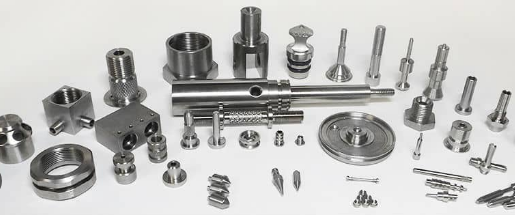Machining Metal Parts Manufacturer: A Comprehensive Guide

Machining Metal Parts Manufacturer crucial process in manufacturing that involves the removal of material from a metal workpiece to achieve desired shapes, dimensions, and surface finishes. This guide provides a thorough overview of the machining process, types of machining, the role of manufacturers, and considerations for selecting a machining partner.
What is Metal Machining?
1. Definition
Metal machining is a subtractive manufacturing process used to create precise metal parts and components. It involves removing material from a solid metal block or billet to form intricate shapes and features. Machining processes can achieve high levels of accuracy and surface finish.
2. Types of Machining Processes
- Turning: Rotates the workpiece against a cutting tool to remove material. Commonly used for cylindrical parts.
- Milling: Uses rotating cutting tools to remove material from the workpiece. Suitable for complex shapes and features.
- Drilling: Creates holes in the workpiece using a rotating drill bit. Often used for creating precise holes of various sizes.
- Grinding: Employs abrasive wheels to achieve high-precision surface finishes and dimensional accuracy.
- Electrical Discharge Machining (EDM): Uses electrical discharges to remove material from the workpiece, ideal for hard materials and intricate shapes.
- Laser Cutting: Uses a laser beam to cut or engrave metal surfaces with high precision.
Key Components of a Metal Machining Manufacturer
1. Facilities and Equipment
A reputable metal machining manufacturer should have state-of-the-art facilities and equipment, including:
- CNC Machines: Computer Numerical Control (CNC) machines provide precise and automated machining capabilities.
- Turning Centers: Specialized machines for turning operations, including CNC lathes.
- Milling Machines: Equipment for performing milling operations with varying degrees of complexity.
- Grinding Machines: Used for achieving high surface finishes and tolerances.
- Inspection Tools: Tools and equipment for measuring and inspecting parts, such as Coordinate Measuring Machines (CMMs) and micrometers.
2. Skilled Workforce
A skilled workforce is essential for delivering high-quality machined parts. Key roles include:
- Machinists: Operators who set up and run machining equipment.
- Engineers: Professionals who design machining processes and ensure parts meet specifications.
- Quality Inspectors: Personnel responsible for inspecting and verifying the accuracy and quality of machined parts.
3. Quality Assurance
Quality assurance is critical in metal machining to ensure parts meet customer specifications and industry standards. Key aspects include:
- Precision: Maintaining tight tolerances and dimensional accuracy.
- Surface Finish: Achieving the desired surface texture and smoothness.
- Testing and Inspection: Implementing rigorous testing procedures to detect defects and ensure quality.
Benefits of Working with a Machining Manufacturer
1. Customization
Machining manufacturers offer the flexibility to produce custom metal parts tailored to specific requirements. This includes:
- Design Adaptability: Ability to machine complex geometries and features.
- Material Variety: Capability to work with various metals, including steel, aluminum, brass, and titanium.
2. High Precision
Machining provides high precision and accuracy, making it ideal for applications requiring tight tolerances and detailed features.
3. Efficiency
Advanced machining techniques and equipment can enhance production efficiency, reduce lead times, and optimize material usage.
4. Quality Control
Manufacturers often implement stringent quality control measures to ensure that parts meet required standards and specifications.
Choosing a Metal Machining Manufacturer
1. Assessing Capabilities
Evaluate the manufacturer’s capabilities to ensure they align with your project requirements. Consider factors such as:
- Machining Equipment: Availability of the necessary equipment and technology.
- Experience and Expertise: The manufacturer’s experience in machining similar parts or materials.
2. Quality Certifications
Check for industry-standard quality certifications, such as ISO 9001, which indicate a commitment to quality management and continuous improvement.
3. Production Capacity
Ensure the manufacturer has the capacity to handle your project size and volume, including any potential scalability needs.
4. Cost and Lead Time
Compare quotes from different manufacturers to assess cost-effectiveness. Consider lead times and delivery schedules to ensure they align with your project timeline.
5. Customer Reviews and References
Review customer feedback and request references to gauge the manufacturer’s reputation and reliability.
Applications of Machined Metal Parts
1. Aerospace Industry
Machined metal parts are used in aerospace applications for components such as engine parts, structural elements, and avionics housings.
2. Automotive Industry
In the automotive industry, machined parts are used for engine components, transmission parts, and structural elements.
3. Medical Devices
Precision machined parts are critical for medical devices, including surgical instruments, implants, and diagnostic equipment.
4. Industrial Equipment
Machined parts are essential for industrial machinery and equipment, including gears, bearings, and hydraulic components.
5. Electronics
Machined metal parts are used in electronics for housings, connectors, and components that require precise manufacturing.
Conclusion
Machining metal parts is a vital aspect of modern manufacturing, offering precision, customization, and high-quality results. Choosing the right metal machining manufacturer involves evaluating their capabilities, quality control measures, production capacity, and cost-effectiveness. By working with a reputable manufacturer, you can ensure that your machined parts meet your specifications and perform reliably in their intended applications.



